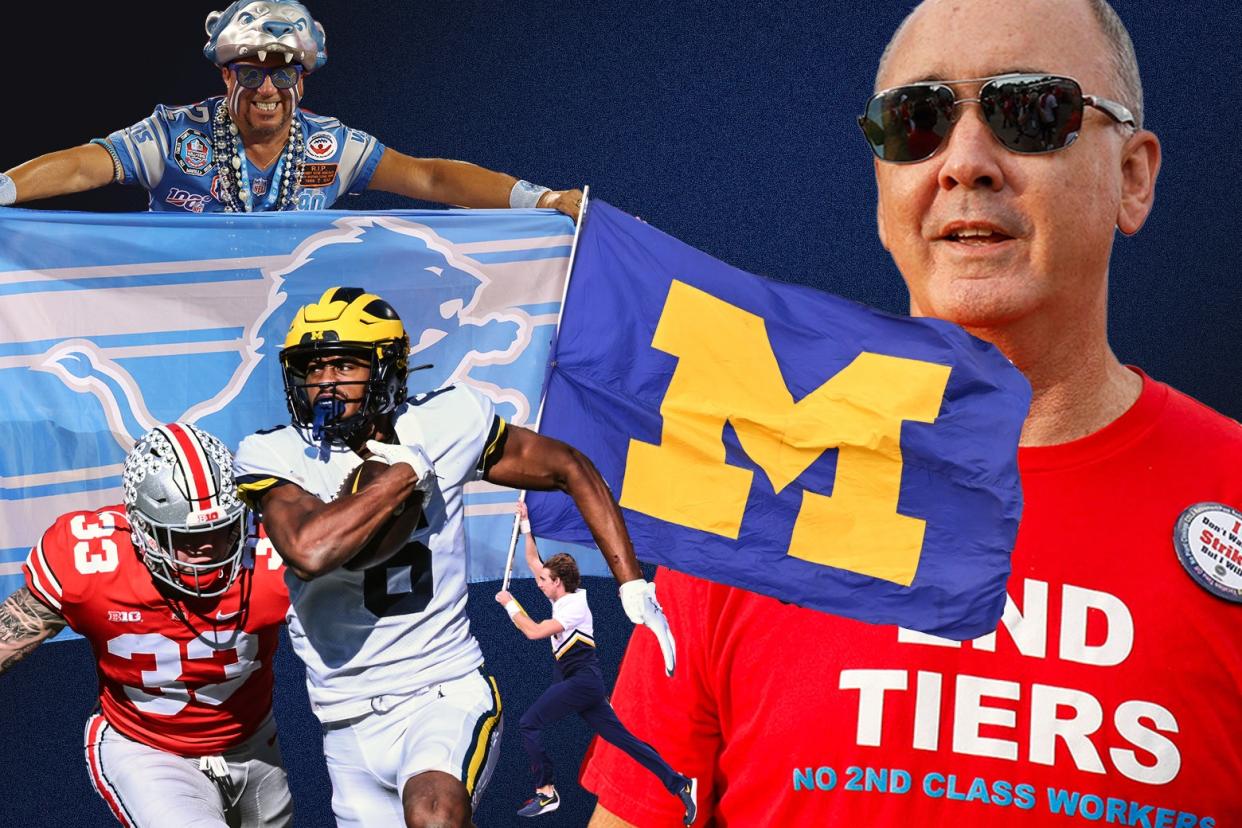The UAW Is on Strike. And Michigan Is So Back.

- Oops!Something went wrong.Please try again later.
- Oops!Something went wrong.Please try again later.
- Oops!Something went wrong.Please try again later.
For a long time, the dramatic arc of the state of Michigan might have been best represented by a 2008 play involving a previously obscure Detroit Lions football quarterback named Dan Orlovsky. In an effort to avoid being sacked, Orlovsky ran out the back of his team’s “end zone”—which, for those not versed in football, is against the rules and results in an immediate penalty. What made the play truly memorable, though, is that Orlovsky didn’t notice what he’d done. He just kept blithely running, looking for an open receiver, making himself into more of a meme for failure with every step. The Lions finished that season 0–16 as one of the worst teams of all time.
The larger trends that the play represented are familiar to any American. Factory closures, population loss, Motown Records moving to Los Angeles, Ohio State beating Michigan like 20 times in a row … it’s been a tough stretch for the Great Lakes State.
But things are turning around. For one, the Lions, under the leadership of madman coach Dan Campbell, appear to be actually good this year, having started the season by defeating the defending NFL champion Chiefs in Kansas City. Michigan has retaken its rightful place atop the Big Ten—there’s a book I can recommend about this—while Ohio State fans mutiny against their coach and quarterback. And as of Thursday night at 11:59 p.m. ET—yes, Michigan is mostly in the Eastern time zone—politicians are falling over themselves to ally themselves with the UAW members who have launched a series of roving “stand up strikes” against the Big Three automakers, a work stoppage that media outlets are heralding as the culminating moment of organized labor’s American resurgence.
Democratic Michigan Gov. Gretchen Whitmer handled the matter with the kind of half-winking embarrassing-mom performance that has helped make her state party organization into the leading light of normal-person liberalism (and put her at the center of speculation about Vice President Kamala Harris getting replaced on the ticket):
Everyone’s rollin’ like a big shot when they’re riding in a union made Michigan whip. pic.twitter.com/waPAfS8JMC
— Governor Gretchen Whitmer (@GovWhitmer) September 14, 2023
(For what it’s worth—and far be it from us to criticize anyone who’s come up with a good way to pass the time while the two presidential candidates from the last cycle prepare to run against each other again—Joe Biden is not going to replace Kamala Harris on the ticket.)
Said Biden, in what labor reporters have interpreted as a major signal of support for the UAW’s position: “Let’s be clear, no one wants a strike. Say it again. No one wants a strike. But I respect the workers right to use their options on in the collective bargaining system, and I understand the workers’ frustration.”
On the other side of the aisle, Republicans like Ohio Sen. J.D. Vance and MAGA Michigan Rep. John James strained to support autoworkers without sounding too much like Democrats but declared their support for autoworkers nonetheless. “Rooting for the auto workers across our country demanding higher wages,” Vance wrote, “and an end to political leadership’s green war on their industry.” (The UAW is based in Detroit, but its initial strikes targeted a Stellantis plant in Toledo, Ohio—“Stellantis” is the corporation that owns Chrysler brands—as well as a Ford plant in Wayne, Michigan, and a General Motors plant in Wentzville, Missouri.)
What these politicos are likely aware of is that initial polling suggests that members of the general public are inclined to take the UAW’s side over the automakers’ by a 2-to-1 margin, which is part of a general trend toward increased support for unions that’s accompanied labor organization at companies like Starbucks and Amazon. (In Gallup polling, public “approval” of labor unions is up 19 points, from 48 to 67, in the past decade.) And, as UAW chief Shawn Fain has been happy to point out, the automakers are currently enjoying a stretch of immense profit at the same time that their employees’ real wages have dropped by 30 percent in two decades.
How sustainable is the Michigan moment? Whitmer, for her part, has been trying to sell the state as a destination for professional-class workers fleeing housing costs in major cities and restrictive laws in red states. (Its new Democratic legislative majorities have passed laws protecting abortion rights and LGBTQ+ tolerance and limiting access to guns.) It’s too early to evaluate the returns on that strategy; the most recent census data that’s available, from 2021, showed the state continuing to lose population to the Sun Belt, but those numbers are pre-Dobbs decision. The automakers themselves say that if they give out the 40 percent pay raise that unions are asking for, they’ll get clobbered in the market (especially for electric vehicles) by manufacturers like Tesla, Honda, and Toyota whose U.S. plants are nonunion.
As for the Lions, only God knows, and Michigan’s 2–0 but has been struggling a bit in the run game. Dan Orlovsky, though, has recovered to become one of ESPN’s lead football analysts—and if that guy can turn things around, who’s to say any of the rest of us can’t?

